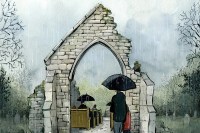No ban on Lawson
Sir: You write that the BBC ‘has effectively banned’ Lord Lawson from items on climate change unless introduced with ‘a statement discrediting his views’ (Leading article, 12 July). There’s a lot of muddled reporting of this story. Lord Lawson hasn’t been in any sense ‘banned’, and the Editorial Complaints Unit finding didn’t suggest that he shouldn’t take part in future items. It found fault with the way the Today item was handled in two respects: firstly that it presented Lord Lawson’s views on the science of global warning as if they stood on the same footing as those of Sir Brian Hoskins, and secondly that it didn’t make clear to listeners that Lord Lawson represented a minority view. There is also no ban on other non-scientists discussing climate change. The BBC is absolutely committed to impartial and balanced coverage on this complex issue. Our position remains exactly as it was — we accept that there is broad scientific agreement on climate change and we reflect this accordingly. We do, however, on occasion offer space to dissenting voices where appropriate as part of the BBC’s overall commitment to impartiality.
Fran Unsworth Deputy director, BBC News and Current Affairs
Happy valleys
Sir: If there is one thing the English enjoy, it is a ‘bad news’ story about Wales, especially if written by a Welshman, and Mr Gage does us proud (‘The betrayal of Wales’, 12 July). I went to a comprehensive school too: Ysgol Eifionydd, Porthmadog. I left that school with eleven GCEs and went on to train as a teacher at Bangor Normal College (Wales).
I recently retired, after nearly 50 years of overseas service, to my birthplace: Beddgelert, a small village near Caernarfon. In December 2012 I was diagnosed with blood clots on both lungs and was admitted to Ysbyty Gwynedd, Bangor. I received excellent care and attention, and after several months on Warfarin and regular follow-up visits, was given the all-clear.
In the last two months I have had cataracts on both eyes removed and the lenses replaced by artificial ones at Bangor. There were no complications, the surgeon was superb, his support staff kindness itself. My local GP’s surgery is based in nearby Porthmadog (Y Feddygfa Wen) — I receive excellent service from all the staff there and cannot praise them enough.
To conclude, I will quote a Birmingham man who now lives in Beddgelert: ‘I came to Wales to get away from immigrants, to enjoy a pleasant environment and to live among friendly people.’
John Christopher Williams
Beddgelert, Caernarfon
Lower berth
Sir: Jeremy Clarke regularly provides you with the best column of the week. Surely you can provide the poor man with the expenses for a berth at a decent hotel when he makes the considerable effort to attend your parties from his base in Devon (12 July)? Or would that compromise his integrity as the Low Life columnist?
Alternatively, does Taki have a spare room? I expect that the column describing that adventure would surpass all his others.
Hugh Anderson
Newmarket, Suffolk
Off the record
Sir: Charles Moore is spot on in his criticism of how government records are saved for posterity, or were and were not saved, in the days of the Dickens dossier (Notes, 12 July). In the 1980s, as a junior Treasury official, one of my responsibilities was to mark files for saving, destruction or review after five years. The files concerned past budgets, not a trivial topic for historians. Decades later, researching at the National Archives a book on the government’s policy on taxing tobacco, I was appalled at some of the decisions I had made, thankfully overturned by those mysterious folk, ‘the Weeders’. Charles Moore is also right that the excellent National Archives should play a much greater role in these activities and must be resourced accordingly.
Dr C.R. Pickering
London W4
Poet patriots
Sir: Leaving to one side David Watkins’s dubious conflation of poetry with the ‘sentimental’, he is surely wrong (Letters, 12 July) to contend that no Englishman in the last 300 years has written a poem expressing love for or pride in Britain and Britishness. Has he, for example, never read T.S. Eliot’s lines in ‘Defence of the Islands’ (those ‘changing nothing/ of their ancestors’ ways… for whom the paths of glory are/ the lanes and streets of Britain’) published years after Eliot had already chosen to become a naturalised British subject? The same broad point could be made of the poetry of Geoffrey Hill, whom the New Republic is not alone in describing as ‘the strongest British poet currently writing’, and whose poetry is deeply rooted in the history of the British Isles as a whole, Worcestershire man though he be.
Sir John Weston
Richmond, Surrey
Freeing modern slaves
Sir: As your leading article on 5 July says, slavery is not confined to the history books. In the UK, nearly 3,000 trafficked women are working as prostitutes at any given time. Instead of being helped by police and the Borders Agency, many victims face prosecution, deportation and the risk of being re-trafficked, which means they are often reluctant to testify against the criminals. At Housing for Women we offer long-term support and safe homes for women who have been trafficked for sexual exploitation, forced labour or domestic servitude. Their stories are horrifying.
The new laws must ensure these women are helped to rebuild their lives. Only then will they feel they have any power to help put an end to this horrific crime.
Jakki Moxham
Chief executive, Housing for Women, London W9





Comments